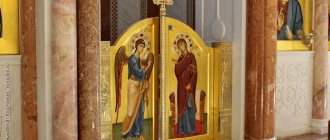Missionary department of the Moscow diocese
Alexey Makarov, Arab historian, graduate of the Institute of Asian and African Countries, student of the Theological Faculty of PSTGU
Prayer - salat, is one of the five pillars of Islam [1] along with shahada (creed), zakat (donation), saum (fasting) and hajj (pilgrimage) [2]. In the territory of the former USSR, Muslim prayer is most often called the Persian word namaz. The vast majority of people who consider themselves Muslims do not perform namaz. Is it possible to be a Muslim and not pray? From the position of Islam, a person who leaves prayer is an infidel, since the word Muslim itself, translated into Russian, means “submissive to God.” The Koran says that those who do not pray will go to hell (Sura al-Muddassir, 42-43). Muhammad himself said that of all human actions, the most precious to the Almighty is the prayer read on time[3]. It turns out that a person who considers himself a Muslim and does not perform namaz either does not study his faith and does not know about the upcoming punishment, or is weak in it.
A true Muslim is required to pray five times a day. The daily minimum that he must perform is called fard prayer, and only by fulfilling it can he be saved. One of the hadiths says that “Allah is free from obligations to a person who intentionally misses fard prayer”[4]. Emphasizing its importance not only for adults, but also for children, Muhammad said: “Tell your children to read prayer when they are seven years old, and beat them if they neglect it after ten, and lay it out for them separately.”[5] Even a serious illness is not a valid reason for missing prayer. Once, during his illness, a certain Imran ibn Hussein asked Muhammad how to read namaz, to which he replied: “Read namaz standing, and if you don’t have the strength to do it, then read it while sitting, and if you don’t have the strength to do it either, then read it on your own.” side"[6]. Moreover, a person is obliged to perform namaz if he is traveling on a train, flying on an airplane and do this (if possible) with the full range of movements[7].
Before starting prayer, a Muslim is required to perform ablution, since Muhammad said that “no prayer is accepted without ablution.”[8] Usually water is used for this, but if it is unavailable, you can use sand. There are two types of ablution: complete (ghusl) and partial (wudu). The first is necessary in order to cleanse oneself from the state of defilement (janaba), which can be caused by sexual intercourse, serious illness, a difficult road or touching a corpse, etc. Muhammad prescribed partial ablution after any discharge from the body, be it urine, feces, air, worms, vomiting, belching. When the companion of the prophet Abu Hurairah was asked what constitutes desecration, he replied: “Blowing air without sound or with sound”[9]. Therefore, it is necessary to perform ablution after sleep, because, as Muhammad said, “the belt of the buttocks is both eyes, therefore, whoever has fallen asleep, let him perform ablution” [10].
Ablution must be performed as Muhammad did: first comes the intention (the decision in the heart to wash only for the sake of Allah), then you need to say Allah Akbar and read the first surah of the Koran, then wash your hands three times up to the wrists, rinse your mouth three times, three Rinse your nose once, wash your face, hands up to the elbows, wipe your head with a damp hand from the forehead to the back of your head, wipe both ears and neck together with your head, then wash your feet to the ankles with your left hand. It is imperative to follow the order of ablution, washing parts of the body one after another before the previous one dries, and always starting from the right side: first wash the right hand, then the left, the right leg, then the left.
In order to receive a reward and not be condemned, you need to do ablution according to all the rules: Once Muhammad, passing by water, saw that people were performing ablution in a hurry and their heels remained dry, then he said: “Death to the heels in Jahannam (hell) ! Perform ablution properly." On the contrary, “Whoever performs ablution properly, his sins are washed away from his body, even from under his nails.”[11]
Unlike Christian prayer, namaz must be performed at a strictly defined time. Every Muslim is required to pray five times a day: at dawn (Fajr), at noon (Dhuhr), after lunch (Asr), during sunset (Maghrib), and after sunset (Isha). Each individual prayer consists of rak'ahs - a set of specific prayer positions and movements during prayers, pronounced in Arabic. Rakaat includes standing upright, bowing, prostrating and sitting on your heels. The number of rakats in each of the five prayers is fixed, for example, at dawn a Muslim must make 2 rakats, in the next two prayers 4 rakats, 3 rakats before sunset and 4 after. One rak'ah takes a maximum of 3 minutes, so a Muslim who follows the minimum prayer rule prays no more than 51 minutes a day.
Each rak'ah consists of one bow (ruku) and two prostrations (sajda). Rakaat includes:
- while praising Allah, the person praying stands, and his thumbs touch his earlobes (O my son! Perform prayer, command what is acceptable, forbid what is reprehensible, and patiently endure everything that befalls you. Indeed, in these matters one must show determination. Koran, 31:17 )
- reading the first sura of the Koran in Arabic (In the name of Allah, the Beneficent, the Merciful! Praise be to Allah, the Lord of the worlds, the Gracious, the Merciful, the Lord of the Day of Retribution! We worship You alone and we pray to You alone for help. Lead us on the straight path, the path of those whom You did not benefit those on whom anger fell, nor those who went astray. Koran, 1). Before reading, you should say the phrase: a'uzu billahi minash-shaitanir rajim (I draw closer to God and move away from the stoned Satan)
- bow from the waist (hand). Before bowing it is said “Allah Akbar”, while bowing three times “subhana rabil azym” (praise be to my Lord)
- bowing to the ground (judgment), alternating with sitting on one's knees. O you who believe! Bow down, prostrate yourself, worship your Lord and do good, that you may succeed. Koran, 22:77.
During prayer, body movements are extremely important: a Muslim must pray the same way as Muhammad did. The Sunnah describes in great detail what movements, how and in what sequence he made at the moment of prayer. It is known, for example, that when he performed rak’ah, “his back was so straight that if water were poured on it, it would not flow”[12]. Muhammad demanded strict precision from his community even in the smallest movements. For example, he said that “the prayer of a person whose nose does not feel the earth to the same extent as his forehead is invalid”[13].
The ritual indeed plays a vital role in the prayer of a Muslim. The slightest mistake by the person praying in a seemingly insignificant detail of the ritual can make the entire prayer invalid, and often sinful. It seems surprising, for example, that passing in front of a person praying in a mosque is a grave sin: “If the one who passes in front of the person praying,” said Muhammad, “knew what sin he was taking upon himself, he would (understand) that standing on forty years would have been better for him than to pass before him.”[14] It is impossible for us Christians to believe in such a pedantic God, to whom the cleanliness of our heels during prayer would be as important as the purity of our hearts.
However, in prayer, not only the external side is important, but also the internal state of a person. Firstly, you need faith in the Almighty and that He hears your prayer (Surah al-Baqarah, 186). Secondly, humility is important, as the Qur'an says that “salat is a heavy burden for everyone except the humble, who are convinced that they will meet their Lord and that they will return to Him (Surah al-Baqarah, 45- 46). As in the New Testament, the Koran denounces hypocrites: “Woe to those praying who do not pray earnestly, who are hypocrites” (Surah al-Maun, 4-6). Although the ritual side of Islam is important and necessary, in order for the Almighty to accept the prayer of a believer, this is not enough; one must also be pious. The Koran says that “pious is the one who believed in the Almighty, in the Day of Judgment, in the angels, the Scriptures, the prophets, who distributed property, even though it was dear to him, to loved ones, orphans, the poor, travelers and those begging for alms, donated for the liberation of slaves , performed salat, gave sunset; “[pious] are those who are faithful to the oath they have taken, patient in trouble and need and in time of danger. These are those who are truthful, those who fear God” (Surah al-Baqarah, 177).
The Monk Abba Dorotheos writes that “there are two fears [of God]: one initial, and the other perfect, and that one is characteristic, so to speak, of those beginning to be pious, while the other is (the fear of) perfect saints who have reached the measure of perfect love.” The first fear is the fear of a slave, the fear of posthumous retribution for sins is available to Muslims. Their perfection is the beginning of Christian piety. Whereas the second fear, the fear of the son, is completely closed to them. This is perfect fear, for the person who has acquired it “does the will of God out of love for God, loving Him specifically in order to please Him; This one knows what essential good consists of, he has learned what it means to be with God. This one has true love...”[15]. This fear is available only to Christians; only by acquiring it can one become a son of God and hear: “Come, you blessed of My Father, inherit the kingdom prepared for you from the foundation of the world” (Matthew 25:34).
When talking with Muslims, it is important not only to show knowledge of how prayer is performed and knowledge of the texts being read, but also to introduce them to the Christian prayer - “Our Father” (it is difficult for Muslims to accept the first two words of this prayer, but otherwise it is quite understandable), the Psalms 50, 90 and others (Psalms - Zabur in the Muslim tradition, so these prayers can be more easily accepted), prayers of the morning and evening rules. It is important to note the depth and intensity of Christian prayer - thanksgiving to God, glorification of God, repentance before God, petitions, etc.
Speaking about prayer, you need to be able to correctly explain why we pray to Jesus Christ, the Mother of God (for Muslims this name for the Virgin Mary (Maryam) is most incomprehensible and unacceptable), saints, why we pray in front of icons. To help, we can advise you to read “Three Words in Defense of Icon Veneration” by St. John of Damascus.
[1] Bukhari vol. 1, p. 5, Muslim vol. 1, p. 32
[2] Muslims use Arabic words to refer to the pillars of Islam and many other terms related to religion
[3] Bukhari vol.1, page 76
[4] Mishkat vol. 1, p. 59
[5] Abu Daoud vol.1, p. 86
[6] Bukhari vol.1, page 150
[7] https://umma.ru/namaz/molitva-v-rakurse-zhizni/379-molitva-v-transporte access date 08/20/12
[8] Muslim vol.1, p. 119
[9] Bukhari vol.1, p.25, Muslim vol.1, p.119
[10] Abu Dawud volume 1, page 39. reported this hadith to 'Ali
[11] Muslim vol.1, p. 125
[12] “Al-Mu'jim Al-Ausat Lit-Tabrani”
[13] Ad-Darakutni, at-Tabarani (3/140/1) and Abu-Nu'aym in “Akhbar Isbahan”
[14] Muslim vol.1, p. 197, “Mishkat” vol.1, p.74
[15] Abba Dorotheos “Soulful teachings” (On the fear of God)
Share:
Is it possible to pray for a Muslim in the Orthodox Church?
Brothers and sisters in Christ! We, as Christians, are obliged to pray for our lost brothers and sisters, be they Mohammedans, pagans, or atheists. In church, notes are not given for them, but in private cell prayer at home we can perform a feat of prayer for them. No matter how far they have gone astray, plunging into darkness, we must still ask the Lord through prayer to show them the Light.
Prayer for the unbaptized:
Prayer of Leo Optina (preferably with the blessing of the confessor)
Seek, Lord, the lost soul (name), if possible, have mercy! Your destinies are unsearchable. Do not make this my prayer a sin for me. But Thy holy will be done.
Prayer to the holy martyr Huar
Oh, venerable saint of the martyr Uara, we kindle with zeal for the Lord Christ, you confessed the Heavenly King before the tormentor, and you suffered zealously for Him, and now the Church honors you, as you are glorified by the Lord Christ with the glory of Heaven, who has given you the grace of great boldness towards Him, and now the Angels stand before Him, and rejoice in the Highest, and see clearly the Holy Trinity, and enjoy the light of the Beginning Radiance, remember also our relatives' yearning, who died in wickedness, accept our petition, and like Cleopatrine, you freed the unfaithful race from eternal torment by Your prayers , so remember those who were buried against God, who died without being baptized, trying to ask for deliverance from eternal darkness, so that with one mouth and one heart we may all praise the Most Merciful Creator forever and ever. Amen.
Prayer for those who have offended and hated us
Master, Lover of Mankind, Jesus Christ, Son of God! You, out of Your inexpressible love for us, Your sinful and unworthy servants, make Your sun shine on the evil and the good, bring rain on the righteous and the unrighteous; You, the Most Good, command us to love our enemies, to do good to those who hate and offend us, to bless those who curse us and to pray for those who attack us and drive us out. You, our Savior, hanging on the tree of the cross, You Yourself forgave Your enemies who cursed You blasphemously, and prayed for Your tormentors; You have given us an image, so that we may follow Your footsteps. You, O dearest Redeemer, who taught us to forgive our enemies, commanded us to pray together for them; I pray to You, Jesus the Most Generous, Son and Lamb of God, take away the sins of the world, forgive your servant (your servant) (name) who has gone to You and accept him (s) not as my enemy, who has done evil to me, but as the one who has sinned before You, I pray to You, infinite in mercy, O Lord our God, accept in peace, who has come to You from this world without reconciliation with me; save and have mercy on him, O God, with Your great and rich mercy. Lord, Lord! Let not Thy wrath, nor Thy wrath, punish Thy servant (Thy servant), who has caused me to attack, insult, reproach and slander; I pray to You, do not remember these sins of him (her), but let go and forgive him (her) all this according to Your love for mankind, and have mercy according to Your great mercy. I pray to Thee, O Most Good and Most Generous Jesus, as the Solver of the bonds of hell, the Victor of death, the Savior of sinners, allow Thy servant (Thy servant) these sins, in the image of the deceased who are bound as captives of hell. You, Lord, said: “If you do not forgive men their sins, neither will your Heavenly Father forgive you your sins”; oh, let this not happen! With tenderness and contrition of heart, I beg You, O Most Merciful Savior, to release him (her) from these bonds of evil obsessions and the wiles of the devil, do not destroy the deceased with Your wrath, but open to him (her), Giver of Life, the doors of Your mercy, so that he may enter into Thy holy city, praising Thy all-holy and magnificent Name and singing the ineffable love of Thy Holy Spirit for perishing sinners. And just as You, Eternal Goodness, remembered on the cross the prudent thief who was crucified with You, making it possible for him to enter paradise, I pray to You, O All-Bountiful One, remember in Your Kingdom also Your servant (Thy servant) who has gone to You ( name) do not close, but open also to him (her) the doors of Thy mercy, for Thine is to have mercy and save us, our God, and to Thee we send glory with Thy Beginning Father, Thy Most Holy and Good and Life-giving Spirit, now and ever and forever and ever. Amen.
In particular, for the peace of the soul? Or for health?
Is it not a sin to light a candle in an Orthodox church for a person of a different religion, for example, a Muslim?
Can. I asked the abbot specifically whether candles can be lit and you can pray for everyone, for people of other faiths, atheists and suicides. But you cannot order the service. The Church believes that prayers for these people are a private matter to which the Church has nothing to do.
The main thing is your sincere prayer for a person, no matter what faith he is. You can light a candle and read prayers or pray in your own words. There is no sin in this
But church services are ordered only for baptized people belonging to the Church of Christ.
I just asked about an Orthodox candle lit for a Muslim from a priest I know, the son of my neighbor. He answered like this (I almost quote):
— The Orthodox Church does not take any part in prayer and other rituals dedicated to unbaptized people. In particular, Muslims. But if a parishioner lights a candle for the health or repose of an unbaptized soul, he will not commit a sin, since he will not deceive the ministers and will not ask them to do anything. And in private you can pray and light candles for anyone and however you want.
Another thing is whether and how an Orthodox candle will help a Muslim. It will probably give some reassurance to the bettor, which can (indirectly) have a beneficial effect on the representative of Islam himself. But you shouldn’t count on the full spiritual results of this ritual. For a Muslim, the relationship with Allah is more important.
“The lack of an adequate number of mosques in large cities forces Russian Muslims to perform Friday prayers in the open air both in summer and winter,” the IslamNews news agency quotes Fatykh Garifullin. – This harms people’s health and creates certain social tensions in society. In this regard, I would like to appeal to the head of the Russian Orthodox Church, the esteemed Patriarch of Moscow and All Rus' Alexy II, with a request to allow Muslims to hold services in Orthodox churches on Fridays. This step would not only be a manifestation of Christ’s love for one’s neighbor and the suffering, but also a wonderful gesture towards establishing mutual understanding between Islam and Orthodoxy in Russia.” According to Fatykh Garifullin, Muslims are allowed to perform namaz everywhere, with the exception of the cemetery, bathhouse and toilet.
“From the point of view of the canons, I can hardly imagine how Muslims will pray in the Orthodox Church,” says political scientist and Islamic scholar Boris Podoprigora. – If only because in Orthodox churches there is no mihrab - a prayer niche that is placed in the wall of the mosque facing Mecca. Besides, I don’t understand why you absolutely need to go to an Orthodox church when you can perform prayer by staying at home and facing the east. It seems to me that there is an element of populism in Fatykh Garifullin’s address.”
According to Boris Podoprigora, the majority of Russian Muslims will not go to pray in Orthodox churches - just as those professing the Christian faith will not go to pray in a mosque. “In Russia there are no traditions of ecumenical unity between representatives of different faiths,” notes Boris Podoprigora. – In other countries this is more developed. For example, both Muslims and Christians can pray in the main temple of the capital of Brazil. There is no such thing in Russia.”
“I am, of course, not an orientalist, but simply a sensible Orthodox person. But, based on the history of relations between the Orthodox and Muslim worlds, I can say that, in my opinion, allowing Muslims to perform namaz in an Orthodox church is absolutely unacceptable,” said Father Konstantin, Archpriest of the Kazan Cathedral in St. Petersburg. “I will say this: let them (Muslims - ed.) first return the St. Sophia Cathedral in Constantinople to us, and then we’ll talk.”
“This, of course, is the patriarch’s business, but, in my opinion, this request from the Tyumen kazyat is unlikely to receive a positive response, otherwise the church will split,” said the rector of one of the churches in St. Petersburg, who wished to remain anonymous. – And you can pray everywhere. The first Christians prayed in caves."
“It seems to me personally that the request of the head of the Tyumen kazyat of the Spiritual Administration of Muslims of the Asian Part of Russia Fatykh Garifullin to allow Muslims to pray in Orthodox churches is not practical, but declarative in nature,” says Konstantin Parkhomenko, priest of the Holy Trinity Izmailovsky Cathedral in St. Petersburg. – I wonder if the Supreme Mufti of Russia, the Muslim hierarch in Russia, knows about this initiative. Does they approve of her? Obtaining official permission for Muslims to perform namaz in Orthodox churches can lead not to good, but to bad consequences. Not to peace, but to religious conflict. If the venerable Mufti Fatykh Garifullin considers it possible for himself personally – I emphasize, personally – to pray in an Orthodox church, I don’t think that his thoughts are shared by the majority of other Muslims, who, by the way, do not allow Christians into the mosque.”
Making istighfar and dua for a deceased Numuslim means turning to Allah Ta'ala on behalf of those people who denied His existence while they were alive. All Muslims are commanded to believe in One Creator. In Islam, each person will personally be held accountable to the Almighty for his actions. If someone dies as an unbeliever and denier of Allah, then the dua read for him will not be accepted and will not bring him any benefit.
Believers are often interested in the question: is it possible to say “May Allah rest his soul in peace”? The answer can be found in many verses of the Quran. The Almighty emphasizes that unbelievers who die in denial of Him will not be pardoned: “But there is no forgiveness for those who commit sins [all their lives], and only when death comes to them says: “Truly, I repent now.” [Allah does not forgive] those who die as disbelievers. For them We have prepared a painful punishment!” (Surah an-Nisa, 4/18).
Another verse also says: “Whether you ask [Allah] for forgiveness for them or not, [it’s all the same, for] even if you ask forgiveness for them seventy times, Allah will never forgive them, for they did not believe in Him and His Messenger, and Allah does not guide the sinners to the straight path" (Surah at-Tawbah, 9/80).
On the other hand, when the uncle of the Prophet Muhammad (PBUH) Abu Talib was on his deathbed, he inspired the dying man to say the words “La illaha illa Allah” and said that until the last breath a person is allowed to ask for forgiveness and given the opportunity to find true faith ( Bukhari, Janaiz, 79).
After this, Rasulullah (sallallahu alayhi wa sallam) was revealed a verse of the Quran: “Neither the Prophet nor the believers should ask [Allah] for forgiveness for the polytheists, even if they are relatives, after they are convinced that they will have to burn in hellfire.” (Surah at-Tauba, 9/113).
Another narration says that the Prophet Muhammad (PBUH) performed the funeral service for the leader of the munafiks Abdullah bin Ubay bin Salul and said: “Never perform Janaza prayer for such dead people and do not carry the body on a stretcher. For they denied Allah and died as disbelievers" (Bukhari, Janaiz, 83).
This is also stated in the Koran: “Never perform a ritual prayer for any of the munafiqs and do not stop at his grave. After all, they did not believe in Allah and His Messenger and died wicked” (Surah at-Taubah, 9/84).
Similar verses say that it is advisable for Muslims not to perform istighfar against unbelievers and munafiqs, and they also do not have to turn to Allah with a request to rest his soul. However, it is advisable for believers to express condolences to the family and friends of the deceased and support them, recommending patience.
Source: islamisemya.com









